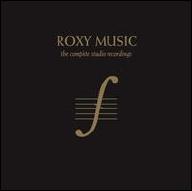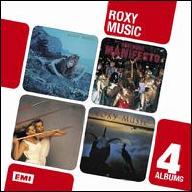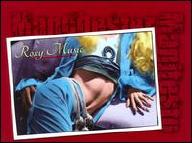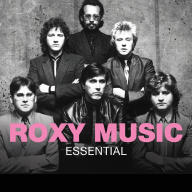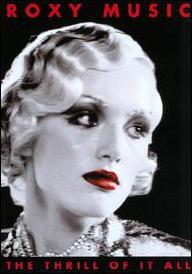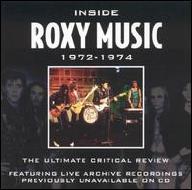The son of a coal miner, Bryan Ferry (vocals, keyboards) had studied art with Richard Hamilton at the University of Newcastle before forming Roxy Music in 1970. While at university, he sang in rock bands, joining the R&B group the Gas Board, which also featured bassist Graham Simpson. Ferry and Simpson decided to form their own band toward the end of 1970, eventually recruiting Andy Mackay (saxophone), who had previously played oboe with the London Symphony Orchestra. Through Mackay, Brian Eno joined the band. By the summer of 1971, the group -- had originally been called "Roxy" but a name change was necessary after the discovery of an American band called Roxy -- had recruited classical percussionist Dexter Lloyd and guitarist Roger Bunn through an ad in Melody Maker; both musicians left within a month, but they did record the group's initial demos. Another ad was placed in Melody Maker, and this time the group landed drummer Paul Thompson and guitarist Davy O'List, who had previously played with the Nice. O'List had left by the beginning of 1972 and was replaced by Phil Manzanera, a former member of Quiet Sun. Prior to recording their first album, Simpson left the band. Roxy Music never replaced him permanently; instead, they hired new bassists for each record and tour, beginning with Rik Kenton, who appeared on their eponymous debut for Island Records.
Produced by Peter Sinfield of King Crimson, Roxy's self-titled debut climbed into the British Top Ten in the summer of 1972; shortly afterward, the non-LP single "Virginia Plain" rocketed into the British Top Ten, followed by the non-LP "Pyjamarama" in early 1973. While Roxy Music had become a sensation in England and Europe due to their clever amalgamation of high and kitsch culture, they had trouble getting a foothold in the United States. Both the first album and the follow-up, 1973's For Your Pleasure (recorded with bassist John Porter), were greeted with enthusiasm in the U.K., but were virtually ignored in the U.S. Frustrated with Ferry's refusal to record his compositions, Eno left the band after the completion of For Your Pleasure. Before recording the third Roxy Music album, Ferry released a solo album, These Foolish Things, which comprised pop/rock covers.
Released in December of 1973, Stranded became the band's first number one album in the U.K. Stranded was recorded with new Roxy member Eddie Jobson, a multi-instrumentalist who previously played with Curved Air; it was also the first record to feature writing credits for Manzanera and Mackay. The album received a warmer reception in the U.S. than its two predecessors, setting the stage for the breakthrough of Country Life in late 1974. Sporting a controversial cover of two models dressed in see-through lingerie -- the cover was banned in several stores, and it was eventually replaced with a photo of a forest in the U.S. -- Country Life was the first Roxy album to break the U.S. Top 40 and became their fourth British Top Ten album. Following a tour with bassist John Wetton, the group recorded Siren. Featuring their first American Top 40 hit, the disco-flavored "Love Is the Drug," Siren was another British Top Ten hit; in the U.S., it was moderate hit, peaking at number 50. Following the tour for Siren, the bandmembers began working on solo projects -- Manzanera formed the prog rock group 801, and Mackay and Ferry both began recording solo albums -- and announced in the summer of 1976 that they were temporarily breaking up. The live album Viva Roxy Music! was released shortly after the announcement of the group's hiatus.
Roxy Music regrouped in the fall of 1978 after spending 18 months on solo projects. Ferry, Manzanera, Mackay, and Thompson added former Ace keyboardist Paul Carrack to the band's lineup and hired Gary Tibbs, formerly of the Vibrators, and ex-Kokomo Alan Spenner as studio bassists; Jobson and Wetton, who were not asked to rejoin the band, formed UK. Roxy Music's comeback effort, Manifesto, was released in the spring of 1979, and it boasted a sleek, disco-influenced soul-pop sound that was markedly different from and more accessible than their earlier records. Manifesto confirmed their British popularity, reaching the Top Ten, and became their highest-charting U.S. record, peaking at number 23 on the strength of the single "Dance Away." Roxy Music supported the album with an international tour that featured Carrack and Tibbs; prior to the tour's start, Thompson left the band after breaking his thumb in a motorcycle accident. Flesh + Blood, the follow-up to Manifesto, was recorded by just Ferry, Manzanera, Mackay, and a host of studio musicians. Released in the summer of 1980, Flesh + Blood became Roxy's second British number one album on the strength of the Top Ten single "Over You"; in America, the album reached the American Top 40. In the spring of 1981, the band's non-LP cover of John Lennon's "Jealous Guy," recorded as a tribute to the slain singer, became the group's only British number one single.
Nearly two years later, Roxy Music returned in the summer of 1982 with Avalon. Marking a new level in the group's production and musical sophistication, Avalon became their biggest album, spending three weeks at the top of the British charts and 27 on the U.S. charts, generating the British hits "More Than This" and "Take a Chance with Me." It became the group's only American gold album, and over the years, it worked its way to platinum status. Following a successful supporting tour for Avalon, the group released the live EP Musique/The High Road in the spring of 1983. The Avalon tour turned out to be Roxy Music's final activity as a group. Ferry began to concentrate on his solo career, beginning with 1985's Boys and Girls. Manzanera and Mackay formed a band called the Explorers in 1985; the pair would record under a variety of guises, as well as pursue solo careers, over the next 15 years. The compilation Street Life: 20 Great Hits, which also featured Ferry's solo hits, was released in 1989. A year later, Heart Still Beating, a live album documenting a 1982 concert, was released. More archival releases helped keep the glitter flame alive, including 1995's The Thrill of It All and 2006's Thrill of It All: A Visual History 1972-1982; both of which featured key tracks and singles, as well as B-sides, promos, and television performances.
In 2001, Ferry, Manzanera, Mackay, and Thompson reunited for a series of live shows to mark the band's 30th anniversary. Manzanera and Thompson also contributed to Ferry's 2002 solo album Frantic, as did Eno, who played on the track "I Thought." The group again reunited (minus Eno) for the 2005 Isle of Wight Festival. However, that same year, the band entered the studio with Eno and began working on songs. While it would be their first time recording together since 1973, the tracks would ultimately end up as part of Ferry's 2010 solo album, Olympia.
In the meantime, Ferry and the non-Eno version of Roxy Music continued appearing live, headlining various festivals around the globe. A career-spanning box set, Roxy Music: The Complete Studio Recordings 1972–1982, arrived in 2012. In March 2019, Roxy Music were inducted to the Rock and Roll Hall of Fame with Ferry, Manzanera, Mackay, and Jobson performing a six-song set at the induction ceremony. In 2022, Roxy Music again re-formed (without Eno) for a tour marking the 50th anniversary of their debut album. ~ Stephen Thomas Erlewine, Rovi




